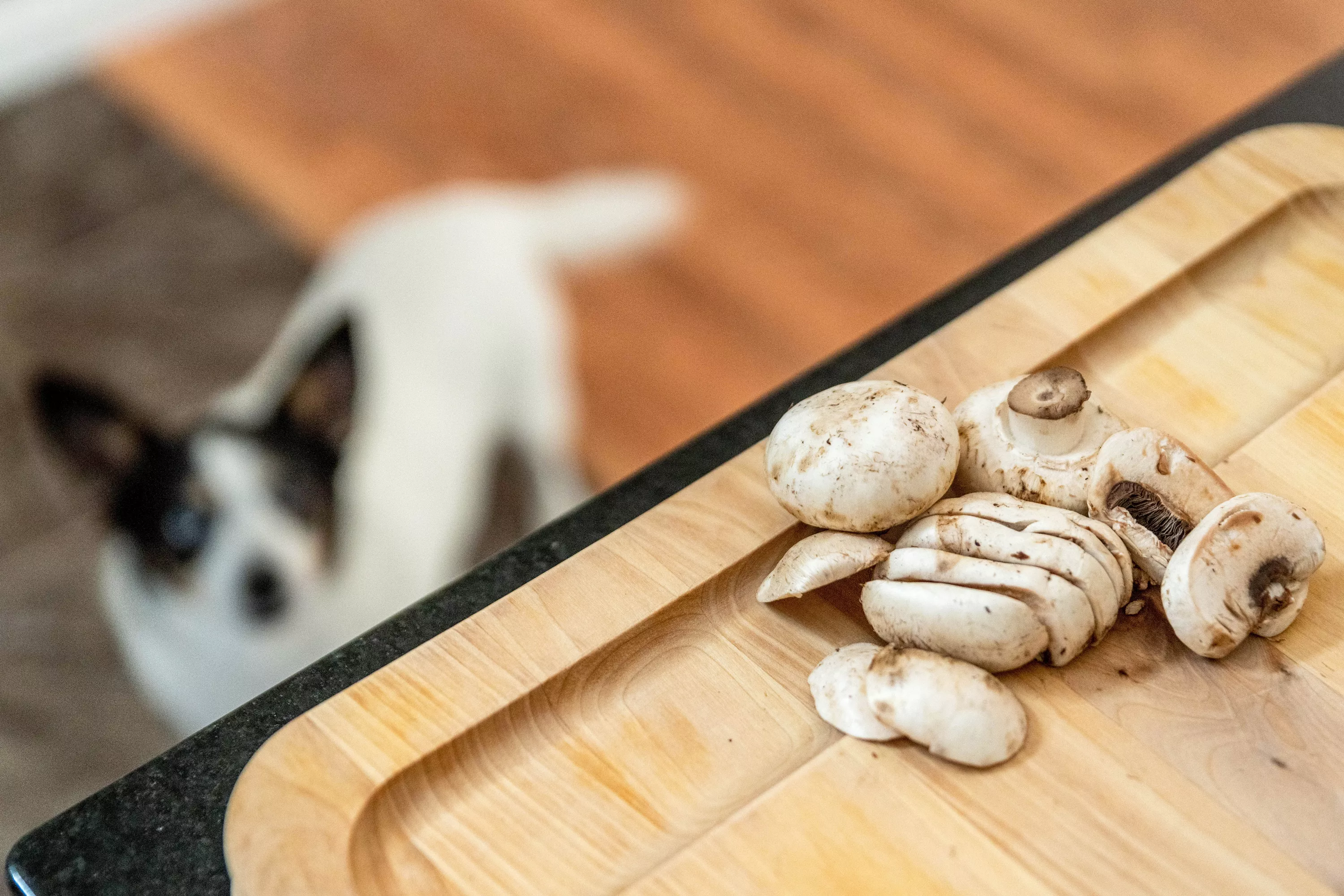Canine can safely eat some kinds of mushrooms, however others are thought-about poisonous. Canine are in a position to eat and digest vitamins from meat and non-meat sources. Most industrial canine meals comprise not solely meat, but additionally plant components, together with grains like oats and corn, starches like candy potatoes and tapioca, and plenty of sorts of vegetables and fruit. Canine also can eat and digest mushrooms, that are a fungus.
Whereas a number of kinds of ‘individuals’ meals are fantastic for canines, some meals are unsafe, so speak to your veterinarian earlier than giving your canine mushrooms or any new meals. Though not each canine will take pleasure in consuming mushrooms, some would possibly like them as a novel deal with. Learn on to study extra in regards to the well being advantages of mushrooms and the best way to safely embrace mushrooms in your canine’s weight-reduction plan.
Table of Contents
What Sorts of Mushrooms Can Canine Eat?
Many kinds of mushrooms are protected to feed canines sparsely. It’s essential to notice that there are various kinds of mushrooms, and never all are protected to devour (neither for people nor canines).
Wild Mushrooms
Many toxic mushroom species develop within the wild. Because of this, you need to by no means permit your canine to eat a mushroom rising in your yard, the woods, or a subject. In case your canine ought to occur to ingest a wild mushroom of an unknown species, seek the advice of your veterinarian instantly. If attainable, take footage of the mushroom and usher in samples in case the mushroom is poisonous.
Retailer-Purchased Mushrooms
Canine can eat any species of mushroom that individuals can. Select mushrooms accessible on the market at your native large-chain grocery retailer. Any mushroom offered at your grocery store will probably be protected for consumption by both individuals or canines. At all times prepare dinner the mushrooms earlier than giving them to your canine. Some well-liked edible mushroom varieties embrace:
- Button
- Chanterelle
- Crimini
- Enoki
- Maitake
- Morel
- Oyster mushrooms
- Porcini
- Portobello
- Puffball
- Shiitake
Medicinal Mushrooms
Some mushrooms are used not simply as meals, however for therapeutic functions as effectively. Known as medicinal mushrooms, these embrace many sorts, akin to maitake (hen of the woods) and shiitake mushrooms. Medicinal mushrooms can be found dried, as a powder or in capsule kind. If you wish to give your canine medicinal mushrooms for particular well being situations, work along with your common veterinarian or a holistic veterinarian to verify it is finished correctly.
Advantages of Mushrooms for Canine
Mushrooms comprise many helpful vitamins, which differ in response to the mushroom species however could embrace amino acids, vitamin A, B nutritional vitamins, copper, enzymes, folate, iron, magnesium, manganese, niacin, pantothenic acid, potassium, riboflavin phosphorus, selenium, thiamin, and zinc. Mushrooms are excessive in fiber and a few mushrooms are excessive in protein. They’re additionally stuffed with antioxidants, a few of which aren’t destroyed by the cooking course of.
Potential Well being Considerations
Some mushrooms are poisonous and even lethal, so solely feed your canine mushrooms that you’d eat your self. At all times prepare dinner mushrooms earlier than feeding them to your canine. Uncooked mushrooms will not be simply digested by canines and may make your canine sick, resulting in vomiting, diarrhea, or each. Even protected, cooked mushrooms could cause gastrointestinal upset if canines eat too many.
Mushroom Toxicity in Canine
The indicators of mushroom toxicity in canines differ relying on the species. Mushrooms can comprise a number of totally different toxins; some trigger liver or kidney harm whereas others have an effect on the central nervous system or gastrointestinal tract. Potential indicators of mushroom toxicity embrace the next:
- Vomiting
- Diarrhea
- Lack of urge for food
- Elevated or decreased urination
- Extreme salivation
- Seizures or tremors
Protected Methods to Feed Mushrooms to Your Canine
Edible mushrooms may be cooked and fed to canines sparsely. Begin by providing your canine a couple of small items of mushrooms to see how they tolerate it. Contact your veterinarian in the event you discover any indicators of sickness. Here is the best way to put together mushrooms in your canine:
- Wash mushrooms by rinsing with chilly water; wipe with a dry paper towel if any seen filth stays
- Chop or slice the mushrooms
- Prepare dinner mushrooms in a pan on the range utilizing a small quantity of dog-safe cooking oil, akin to olive oil
- Don’t add salt or another seasonings. If you wish to increase taste, add some low-sodium hen or beef broth to the pan close to the tip of cooking and sauté till the broth is absorbed.
- Cool and serve the mushrooms on their very own, or combine them into your canine’s common meals.
As with all treats, feed mushrooms sparsely. Too many mushrooms (or another meals for that matter) can upset the stability of your canine’s common pet food. All further meals, together with mushrooms, ought to make up lower than 10 % of your canine’s whole weight-reduction plan. The remaining 90 % needs to be his common, complete-and-balanced meals.

